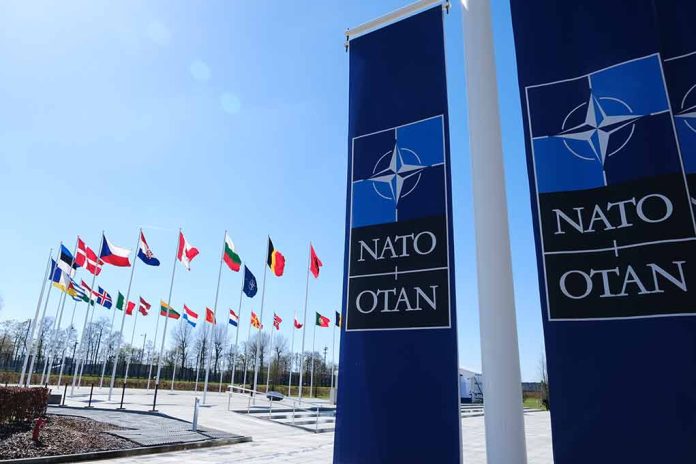
NATO Secretary General Mark Rutte calls for European nations to slash social spending and boost defense budgets, citing Russian threats.
At a Glance
- NATO chief urges European members to reallocate funds from social welfare to military spending.
- Rutte emphasizes the need for a “wartime mindset” and increased defense production.
- He warns that Europe is unprepared for potential threats in the next 4-5 years.
- Call aligns with earlier U.S. pressure for NATO countries to meet 2% GDP defense spending target.
- Criticism emerges from various political figures regarding NATO’s strategy and spending.
Rutte’s Call for Increased Defense Spending
NATO Secretary General Mark Rutte has issued a stark warning to European member nations, urging them to significantly increase their defense budgets by reallocating funds from social welfare programs. This call comes amid growing concerns about potential threats from Russia and other global powers. Rutte’s message emphasizes the need for a rapid shift in priorities to ensure the alliance’s readiness in the face of evolving geopolitical challenges.
Speaking at a Carnegie Endowment event in Brussels, Rutte acknowledged the difficult choices ahead but stressed the importance of redirecting even a small portion of social security funds towards strengthening military capabilities. This reallocation, he argues, is crucial for preserving safety and freedom in the long term.
In his first major speech as @SecGenNATO, Mark Rutte highlighted the critical need to ramp up defence spending and defence production in an increasingly turbulent security environment
Tap below for his speech ↓
— NATO (@NATO) December 12, 2024
Europe’s Unpreparedness and the “Wartime Mindset”
Rutte’s urgency stems from his assessment that European nations are not adequately prepared for potential conflicts in the near future. He warns of a looming threat, particularly from Russia, which he believes is gearing up for long-term confrontation with Ukraine and NATO allies. This perspective has led Rutte to call for a shift to what he terms a “wartime mindset” among NATO members.
“We are not ready for what is coming our way in four to five years,” Rutte stated, underscoring the critical nature of the situation. “It is time to shift to a wartime mindset, and turbo-charge our defense production and defense spending.”
The NATO chief’s remarks highlight the alliance’s concern about the current state of European defense capabilities and the perceived need for urgent action to address these shortcomings. Rutte’s push for increased military spending aligns with longstanding U.S. pressure on NATO countries to meet the alliance’s target of allocating 2% of GDP to defense.
Challenges and Criticisms
While Rutte’s call for increased defense spending has garnered support from some quarters, it has also faced criticism and skepticism. The proposal to redirect funds from social programs to military budgets is particularly contentious, with some arguing that it could negatively impact social welfare systems across Europe.
“I know spending more on defence means spending less on other priorities. But it is only a little less,” Rutte argued, attempting to assuage concerns about the impact on social programs. However, this stance has not quelled all opposition to the proposed shift in spending priorities.
Critics of NATO’s strategy, including French politician Florian Philippot and former U.S. representative David Stockman, have voiced their disagreement with the alliance’s approach. They question the necessity of such significant increases in military spending and the potential consequences for domestic social programs.
The Road Ahead for NATO
As NATO faces evolving global threats, including those from Russia, China, North Korea, and Iran, the alliance finds itself at a crossroads. Rutte’s call for a return to Cold War-level military spending reflects the perceived gravity of the current geopolitical situation. However, the path forward remains fraught with challenges, both in terms of securing the necessary funding and maintaining public support for such significant shifts in national spending priorities.
“Russia, China, but also North Korea and Iran, are hard at work to try to weaken North America and Europe,” Rutte warned, highlighting the multifaceted nature of the threats facing NATO members.
As European nations grapple with Rutte’s call to action, the coming months and years will likely see intense debates over defense spending, social welfare priorities, and the overall strategic direction of NATO. The alliance’s ability to navigate these challenges while maintaining its collective security mission will be crucial in shaping the future of European and global security landscapes.
Sources:
- NATO instructs members to redirect social spending to armies
- NATO Chief Calls for Defense Surge to Avoid ‘Big War’ With Russia
- NATO Calls on Nations To Divert Social Security Money to Defense







